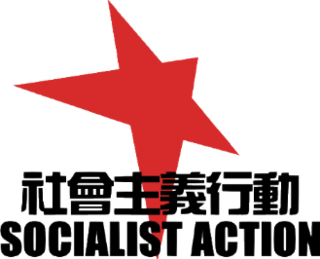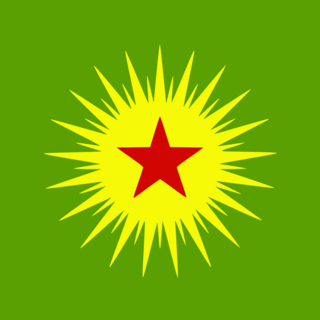Libertarian socialism is an anti-authoritarian and anti-capitalist political current that emphasises self-governance and workers' self-management. It is contrasted from other forms of socialism by its rejection of state ownership and from other forms of libertarianism by its rejection of private property. Broadly defined, it includes schools of both anarchism and Marxism, as well as other tendencies that oppose the state and capitalism.

Leninism is a political ideology developed by Russian Marxist revolutionary Vladimir Lenin that proposes the establishment of the dictatorship of the proletariat led by a revolutionary vanguard party as the political prelude to the establishment of communism. Lenin's ideological contributions to the Marxist ideology relate to his theories on the party, imperialism, the state, and revolution. The function of the Leninist vanguard party is to provide the working classes with the political consciousness and revolutionary leadership necessary to depose capitalism.
Socialism is an economic and political philosophy encompassing diverse economic and social systems characterised by social ownership of the means of production, as opposed to private ownership. It describes the economic, political, and social theories and movements associated with the implementation of such systems. Social ownership can take various forms, including public, community, collective, cooperative, or employee. As one of the main ideologies on the political spectrum, socialism is considered the standard left wing ideology in most countries of the world. Types of socialism vary based on the role of markets and planning in resource allocation, and the structure of management in organizations.
State capitalism is an economic system in which the state undertakes business and commercial economic activity and where the means of production are nationalized as state-owned enterprises. The definition can also include the state dominance of corporatized government agencies or of public companies in which the state has controlling shares.

Mortimer "Murray" Bookchin was an American social theorist, author, orator, historian, and political philosopher. Influenced by G. W. F. Hegel, Karl Marx, and Peter Kropotkin, he was a pioneer in the environmental movement. Bookchin formulated and developed the theory of social ecology and urban planning within anarchist, libertarian socialist, and ecological thought. He was the author of two dozen books covering topics in politics, philosophy, history, urban affairs, and social ecology. Among the most important were Our Synthetic Environment (1962), Post-Scarcity Anarchism (1971), The Ecology of Freedom (1982), and Urbanization Without Cities (1987). In the late 1990s, he became disenchanted with what he saw as an increasingly apolitical "lifestylism" of the contemporary anarchist movement, stopped referring to himself as an anarchist, and founded his own libertarian socialist ideology called "communalism", which seeks to reconcile and expand Marxist, syndicalist, and anarchist thought.

Before the perestroika Soviet era reforms of Gorbachev that promoted a more liberal form of socialism, the formal ideology of the Communist Party of the Soviet Union (CPSU) was Marxism–Leninism, a form of socialism consisting of a centralised command economy with a vanguardist one-party state that aimed to realize the dictatorship of the proletariat. The Soviet Union's ideological commitment to achieving communism included the national communist development of socialism in one country and peaceful coexistence with capitalist countries while engaging in anti-imperialism to defend the international proletariat, combat the predominant prevailing global system of capitalism and promote the goals of Russian Communism. The state ideology of the Soviet Union—and thus Marxism–Leninism—derived and developed from the theories, policies, and political praxis of Marx, Engels, Lenin, and Stalin.
Hikmet Ali Kıvılcımlı was a Turkish communist leader, theoretician, writer, publicist, and translator. He was the founder of the Vatan Partisi (VP).

The Democratic Union Party is a Kurdish left-wing political party established on 20 September 2003 in northern Syria. It is a founding member of the National Coordination Body for Democratic Change. It is the leading political party among Syrian Kurds. The PYD was established as a Syrian branch of the Kurdistan Workers Party (PKK) in 2003, and both organizations are still closely affiliated through the Kurdistan Communities Union (KCK).
State socialism is a political and economic ideology within the socialist movement that advocates state ownership of the means of production. This is intended either as a temporary measure, or as a characteristic of socialism in the transition from the capitalist to the socialist mode of production or to a communist society. State socialism was first theorised by Ferdinand Lassalle. It advocates a planned economy controlled by the state in which all industries and natural resources are state-owned.

Socialist Party of the Oppressed is a Marxist-Leninist political party in the Republic of Turkey. It defines itself as "a militant revolutionary socialist party fighting for a workers'-labourers' federative republic in Turkey and Northern Kurdistan."
Socialist Refoundation Party is a Marxist–Leninist and socialist feminist political party in Turkey. It was founded on 24 June 2013 as a merger of far-left factions Social Freedom Party Initiative, Workers' Socialist Party, Socialist Future Party Initiative, and the Movement for Socialist Unity. Latter, Social Freedom Party Initiative broke away from the SYKP foundation process and later evolved into Social Freedom Party. Party has a tri-coloured star as its logo, red representing socialism, purple for feminism and green for environment.
People's democracy is a theoretical concept within Marxism–Leninism and a form of government which developed after World War II and allows in theory for a multi-class and multi-party democracy on the pathway to socialism. People's democracy was established in a number of European and Asian countries as a result of the people's democratic revolutions of the 1940s.
In Trotskyist political theory, a degenerated workers' state is a dictatorship of the proletariat in which the working class' democratic control over the state has given way to control by a bureaucratic clique. The term was developed by Leon Trotsky in The Revolution Betrayed and in other works.
Socialist economics comprises the economic theories, practices and norms of hypothetical and existing socialist economic systems. A socialist economic system is characterized by social ownership and operation of the means of production that may take the form of autonomous cooperatives or direct public ownership wherein production is carried out directly for use rather than for profit. Socialist systems that utilize markets for allocating capital goods and factors of production among economic units are designated market socialism. When planning is utilized, the economic system is designated as a socialist planned economy. Non-market forms of socialism usually include a system of accounting based on calculation-in-kind to value resources and goods.

The Socialist Party of Great Britain (SPGB) is a socialist political party in the United Kingdom. Founded in 1904 as a split from the Social Democratic Federation (SDF), it advocates using the ballot box for revolutionary purposes and opposes both Leninism and reformism. It holds that countries which claimed to have established socialism had only established "state capitalism" and was one of the first to describe the Soviet Union as state capitalist. The party's political position has been described as a form of impossibilism.

The Committee for a Workers' International (CWI) was an international association of Trotskyist political parties and organisations. Today, two groups claim to be the continuation of the CWI, the refounded Committee for a Workers' International and International Socialist Alternative.

Socialist Action is a Trotskyist political organisation in Hong Kong. It is affiliated with International Socialist Alternative (ISA) and works closely with the ISA sections in China and Taiwan. It describes itself as being based on the method and analysis of Marxism, to politically re-arm and organise the working class in the fight for a socialist world. They oppose the Chinese Communist Party, which they claim has made China the 'Sweatshop of the World' with one of the most extreme wealth gaps on the planet. They stand for the creation of fighting independent trade unions by Chinese workers to fight against capitalist exploitation and authoritarian rule.
A socialist state, socialist republic, or socialist country, sometimes referred to as a workers' state or workers' republic, is a sovereign state constitutionally dedicated to the establishment of socialism. The term communist state is often used synonymously in the West, specifically when referring to one-party socialist states governed by Marxist–Leninist communist parties, despite these countries being officially socialist states in the process of building socialism and progressing toward a communist society. These countries never describe themselves as communist nor as having implemented a communist society. Additionally, a number of countries that are multi-party capitalist states make references to socialism in their constitutions, in most cases alluding to the building of a socialist society, naming socialism, claiming to be a socialist state, or including the term people's republic or socialist republic in their country's full name, although this does not necessarily reflect the structure and development paths of these countries' political and economic systems. Currently, these countries include Algeria, Bangladesh, Guyana, India, Nepal, Nicaragua, Sri Lanka and Tanzania.

Democratic confederalism, also known as Kurdish communalism or Apoism, is a political concept theorized by Kurdistan Workers Party (PKK) leader Abdullah Öcalan about a system of democratic self-organization with the features of a confederation based on the principles of autonomy, direct democracy, political ecology, feminism, multiculturalism, self-defense, self-governance and elements of a cooperative economy. Influenced by social ecology, libertarian municipalism, Middle Eastern history and general state theory, Öcalan presents the concept as a political solution to Kurdish national aspirations, as well as other fundamental problems in countries in the region deeply rooted in class society, and as a route to freedom and democratization for people around the world.

The Peoples' Democratic Congress is a union of numerous left-wing political movements, organisations and parties in Turkey that aims to fundamentally recreate Turkish politics and represent oppressed, exploited individuals who face ethnic, religious or gender discrimination. The Congress is anti-capitalist and was formed on 15 October 2011. It organises numerous conferences and holds official congresses. In 2012, the Congress established a new party that would act as its political wing, the Peoples' Democratic Party (HDP). A similar union of left-wing groups, the United June Movement, was formed in 2014.










